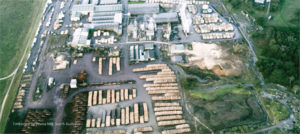Australia’s timber mills are continuing to operate during the COVID-19 lockdown as normal and will do so until ordered otherwise. Building sites have been already been deemed essential activities by the Federal Government, spared from the tight restrictions placed on restaurants, pubs, clubs, cinemas and other non-essential businesses. Source: Timberbiz
However, New Zealand moved to Alert Level 4 this morning. Both Timberlink and OneFortyOne, which have operations in New Zealand, have advised they will be closing down the operations because they are regarded as a non-essential business under the NZ Government definition.
It is expected that Level 4 restrictions will stay in place in NZ for at least four weeks.
Hyne Timber’s Australian operations remain open for business.
“We are currently not required to close under The Australian Prime Minister’s directive for non-essential businesses,” a company statement said. “We are manufacturing and despatching our products as usual. We do not anticipate any impact on our supply capability in the short-term.
“We are making further changes to the way we work at our sites.
“We have additional health and safety measures in place for our teams, customers and suppliers. We are closely monitoring government and health service advice in response to the fast-changing Coronavirus (COVID-19) situation.’’
Hyne has stopped all face-to-face meetings for its teams as part of its social distancing measures and all domestic and intrastate travel has been stopped.
“Our Customer Service Team members are still available to offer support,” the company said.
Timberlink’s Australian mills and distribution centres are fully operational however, its Blenheim sawmill on New Zealand’s South Island will cease operations effective the close of business today for at least four weeks.
Timberlink said that shutting down its equipment safely was its top priority; shutdown of major machinery was underway yesterday and would take place over the next 48 hours.
Boiler and kilns would be progressively ramped down over the balance of the week to ensure they were safely stopped.
“The safety of our staff is paramount, and we will ensure that this is done in line with all Timberlink safety and government procedures,” the company said.
For New Zealand domestic customers this meant there will be no despatch from yesterday.
For Australian domestic customers that receive New Zealand treated H3, Timberlink Australia has treated H3 inventory available.
“Our New Zealand export manager John McPhail will work with account managers to organise this inventory support with timber from Australia,” the company said.
“Timberlink Australia will endeavour to assists New Zealand Green Case and RSKD export customers with Timber volume from Australia.”
OneFortyOne said that as Trans-Tasman business with employees and stakeholders in Australia and New Zealand its response was in line with the advice provided by the Australian and New Zealand Governments.
“OneFortyOne is closely monitoring the developments concerning the COVID-19 pandemic,” the company said.
“At all times we strive to respond appropriately, adhering to the expert advice from local and global health authorities – while continuing to operate effectively and provide services within this ever-changing environment.”
In Australia all employees who were able to work from home were doing so.
“Our forest and mill located in the Green Triangle continue to operate,” the company said.
“We have strict physical distancing and disease management protocols in place.
“First and foremost, it is the wellbeing of our people, our contractors, customers and local regional communities that are our highest priority.
“Looking ahead, we will continue to focus on three priorities: the well being of our employees and their families, our business continuity during this uncertain time and managing any new challenges.”
On Kangaroo Island where 95% of Kangaroo Island Plantation Timber’s stock was burnt, the company is now working through post-fire harvest and land-clearing options for the fire-affected resource on behalf of its shareholders as well as the 12 independent growers on the Island.
“The Kangaroo Island Seaport remains essential to the company and to the future prosperity of Kangaroo Island,” KIPT’s managing director Keith Lamb said.
“It will allow the employment benefits of forestry to flow and will assist in the Island’s recovery from the bushfires as the company implements its harvest work,” Mr Lamb said.
He said the Island now faced a second significant challenge with the global impact of the COVID-19 pandemic.
“As the Island faces this new challenge and its severe impacts on tourism and hospitality, the commencement of construction and forestry operations will provide a significant boost for the local economy and more specifically for workers seeking new opportunities,” Mr Lamb said.
“The company has already recruited six new employees as part of its recovery plan following the bushfires. The new staff are working with the five employees we had already on clearing and rebuilding fencing, particularly with our neighbours, and prioritising those who have stock to contain.”







